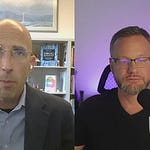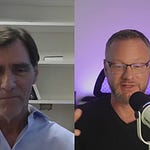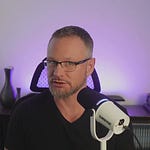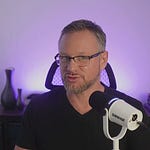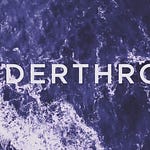According to this week’s guest, Michael Strong, the institutions meant to serve humanity—particularly academia and public schooling—have become obstacles to our flourishing.
But instead of dwelling on criticism, Strong offers a compelling alternative vision grounded in voluntary action, entrepreneurship, and living the mantra “Criticize by creating.”
The Indictment of Higher Education
Strong pulls no punches in his assessment of modern academia, calling higher education “the world’s leading social problem.” His reasoning is twofold and damning. First, he argues that most of academia remains hostile to free markets despite overwhelming historical evidence that economic freedom, property rights, and the rule of law create prosperity. “Seven billion people are unnecessarily miserable because of the anti-capitalist ideologues in academia,” he states bluntly.
Second, Strong contends that academia propagates a victimhood narrative that undermines individual agency. While claiming to help the disadvantaged, universities instead damage students by teaching them to see themselves primarily as victims rather than as empowered agents capable of shaping their own lives. This victim mentality, he suggests, has metastasized from universities down into primary and secondary education, creating what he calls “a cancer in society.”
The Youth Confinement Century
Strong’s critique extends beyond ideology to the very structure of modern schooling. He traces a historical arc showing how what began as modest common schools teaching basic literacy devolved into an all-encompassing system that confines young people during their most energetic years. The statistics he cites are sobering: teenage suicide increased 300% between the 1950s and 1990—well before social media—suggesting the problem lies not primarily with technology but with the institution of high school itself.
Drawing on historical context, Strong notes that the concepts of “teenager” and “adolescent” are 20th-century inventions. Throughout history, young people at puberty transitioned to adult responsibilities—hunting, gathering, working, contributing. Ben Franklin, Andrew Carnegie, and Thomas Edison all began working at thirteen. Forcing these “incredibly powerful, active young people into 30 students in a room, passive all day long, was a recipe for disaster.”
He references the famous rat park experiments: rats caged and offered cocaine became addicted; rats in an enriched environment ignored the drugs. The parallel is unmistakable.
Soul Destruction
But the problem runs deeper than mere confinement. Strong identifies what philosopher Alistair MacIntyre called the collapse of virtue cultures. Until the 20th century, societies worldwide raised young people with clear standards of excellence, shared norms, and templates for becoming admirable adults. Cultural relativism, championed by elites and academics, deliberately undermined these norms under the banner of fighting “bourgeois morality.”
The result? A generation ping-ponging between standardized institutional warehousing by day and “digital prisons” by night, their moral formation left to “pop culture, porn, social media slop, and stupid TikTok videos.” Strong characterizes the period from 1950 to 2050 as “the dark century” when most students were trapped in public high schools that destroyed their souls.
Socratic Alternative
Against this bleak backdrop, Strong offers a radically different model. His approach centers on Socratic dialogue, aristocratic tutoring, immersion in intellectual milieus, and freedom to explore. He’s been conducting weekly Socratic dialogues with a young woman named Alana since she was four; now thirteen, she’s written three books, is taking Harvard’s computer science course, and engages in sophisticated discussions of Homer and Richard Dawkins.
This isn’t about cramming information or teaching to tests. It’s about nurturing intellectual curiosity through meaningful conversation, much as John Stuart Mill developed his genius not just through his father’s tutoring but through dinner table conversations with leading philosophers. Strong emphasizes that alongside structured learning, children need freedom to explore—the very freedom that fuels entrepreneurship, innovation, and creativity.
Educational Renaissance
Strong sees cause for optimism in what he calls an educational renaissance driven by Educational Savings Accounts (ESAs). In Arizona and Florida, fewer than half of students now attend zoned public schools. He predicts that within 20 years, roughly 20% of U.S. students will be in some form of personalized, high-agency learning environment.
Models are proliferating: Alpha Schools with their two-hour intensive learning blocks combining AI tracking, human coaching, and apps to optimize focus; Montessori variants; religious schools; military academies; microschools; and homeschooling. The key is competition and experimentation rather than standardization—letting “a thousand schools bloom.”
Strong is particularly excited about Alpha Schools’ approach of ensuring students are “totally focused for two hours a day on these apps that optimize their learning with both humans and AI.” While their claim that students learn “twice as fast” might seem modest, he notes it’s actually significant given how little most students learn in traditional settings.
From Education to Governance
Strong’s philosophy of “criticizing by creating” extends beyond education to economic development through what he calls “zoning for prosperity.” Poor countries are poor because of bad law and governance, not lack of resources or entrepreneurial spirit. His wife, Magatte Wade, a Senegalese entrepreneur, embodies this principle as she works to create special economic zones in Africa with high-quality rule of law—essentially providing governance as a service.
The model has precedent: Dubai created the Dubai International Financial Center in 2004, hiring common law judges to operate within Sharia-dominated Dubai. Twenty years later, Dubai is a top-ten global financial center. Similarly, Prospera in Honduras and other zone projects aim to create Hong Kong-quality governance within countries that otherwise have stifling regulatory environments.
This isn’t colonialism—it’s entrepreneurship. African countries, Strong notes, are the most regulated in the world, with literally millions of regulations stifling economic activity. Wade doesn’t want charity for Africa; she wants the legal infrastructure that allows Africans to create prosperity themselves. “Africans just want to be rich,” Strong quotes his wife. “They’re tired of being poor.”
The Masculinity Question
The conversation touches on concerning trends among young men, who are increasingly rejecting the “woke” establishment that constantly tells them they’re inherently problematic. While Strong celebrates this rejection of victimhood ideology, Borders raises valid concerns about some young men gravitating toward “tyrannical father” archetypes—figures like Andrew Tate who offer unhealthy visions of masculinity.
This highlights the vacuum left by institutional failure: when schools don’t form character and culture doesn’t transmit virtue, young people will find mentors somewhere—and not always good ones. Strong’s vision of mentorship through Socratic dialogue offers a healthier alternative, albeit one that requires significant adult investment.
A Voluntary World
Strong’s parting message returns to his core mantra: criticize by creating. Rather than getting consumed by political hatred and the “endless civil war,” people should take initiative to improve their own lives and the lives of others. “In a voluntary world, all of us would wake up all day, every day, and we would make a living by adding value to the lives of others.”
This isn’t naive optimism. Strong acknowledges that the political battles may sometimes be necessary. But he insists that individual happiness, community flourishing, and global prosperity come not from winning political wars but from building alternatives—whether alternative schools, alternative cities, or alternative ways of organizing human cooperation.
The young people Strong finds most inspiring aren’t activists or politicians but entrepreneurs drawn to the special economic zone movement because “they see that it’s creating prosperity... plus careers.” They’re not waiting for permission or political victory. They’re building the future they want to inhabit.
Conclusion
Strong’s vision is simultaneously radical and traditional: radical in rejecting the totality of modern institutional education and government-dominated development, traditional in seeking to restore virtue cultures, apprenticeship, meaningful work, and voluntary cooperation. His optimism stems not from faith in reform but from evidence of alternatives already working—homeschoolers thriving, zones creating prosperity, entrepreneurs solving problems.
Whether discussing a thirteen-year-old’s intellectual development, the regulatory stranglehold on African entrepreneurship, or the poison of victimhood culture in universities, Strong returns to the same insight: human flourishing requires freedom, responsibility, and the space to create. Institutions meant to enable these have instead become barriers. The solution isn’t to capture and reform them but to build new institutions that work—one school, one dialogue, one zone at a time.
As our wick burns down, Strong suggests, the question isn’t whether we’ve won political battles but whether we’ve lit other wicks—whether we’ve created alternatives that allow others to flourish. In education, governance, and life itself, the path forward isn’t through the institutions but around them, toward a more voluntary world where value creation replaces political combat as the organizing principle of human cooperation.




